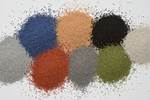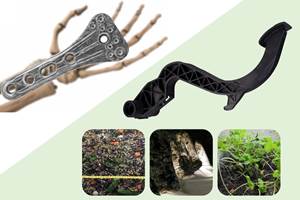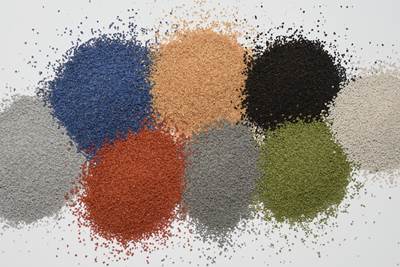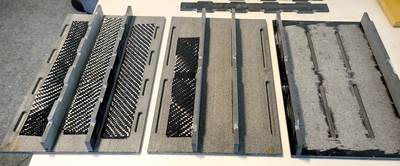BioPowder introduces olive stone-based fiber additives, fillers
Olea FP brand transforms olive oil byproducts into high-quality powders with optimal performance that act as fillers and additives for composite applications.
Olive stone powder. Source (All Images) | BioPowder
(Birkikara, Malta), a specialist in fiber additives and functional composite fillers originating from the circular economy, highlights the development of additives made from upcycled olive stones. Branded under Olea FP (Functional Powder), the transformation of olive oil byproducts into high-quality powders that enable characteristics such as stability, homogeneous particle shape and bright colors target composites applications, in addition to rubber compounds, PVC-based composite systems and linoleum, and sealant formulations and adhesives.
A variety of plant-derived fiber additives — wood fibers, starch, flax, hemp, corn cob, bagasse and coconut fiber, just to name a few — have been used in composites manufacturing. According to BioPowder, in addition to not always producing satisfactory mechanical properties, many natural fillers are not necessarily sustainable, in spite of their herbal origin.
The company notes that it has tested numerous circular raw materials, i.e., agricultural sidestreams, and have found that refined, pulverized (from olive oil production byproducts) demonstrate the most optimal performance due to their physical and chemical particle structure. As a fully bio-based and biodegradable line of functional composite fillers, Olea FP offers the following advantages:
- High stability: Olive stone powder does not expand in contact with liquids and maintains its shape. Its particles can be customized to any grain size range that will remain stable, even when bearing load.
- Low water and oil absorption: Olea FP composite fillers do not change their shape or texture in oily or watery formulations such as coatings. Therefore, they are easy-to-handle reinforcing fibers with predictable results.
- Hardness and abrasion resistance: Composite additives made from pulverized olive stones have a hardness of 3.5 (Mohs scale). When used as reinforcing fibers in natural composites, BioPowder natural fillers can significantly enhance tensile strength, resistance and durability of the finished material. As fiber reinforcement in resin and/or polymer compounds, they improve the end products’ abrasion resistance and are therefore suitable for use in numerous performance composites.
- Lightweight: With a bulk density of 500-550 g/l, Olea FP additives are ideal natural fillers for lightweight composites used in aviation, shipbuilding, automotive and medical applications. In addition, different types of performance coatings (water- and bio-based) can be enhanced accordingly.
- Variety of texture effects: This is made possible through custom sizes of the company’s powdery and granular fiber additives and natural fillers. Fine powders are the solution for plain surfaces while coarse granules can add visible texture and anti-slip effects.
- Environmental and human sustainability: BioPowder additives are made exclusively from sidestream products (upcycled agricultural residues). Hence, the company does not process any food/feed items or crops. This is of particular relevance for life cycle assessments (LCAs) of natural composites. The production of the composite fillers is emission-free and only a reasonable amount of electricity is required. The latter can partially be derived from renewable sources of energy such as solar panels or biomass boilers.
Reinforced biocompound for brake pads.
BioPowder caters to industrial customers, preferably with a strong focus on R&D in the field of natural fiber composites. Its goal is to partner with innovative B2B players wishing to make a difference in terms of technical and environmental performance. Therefore, the company provides its reinforcement solutions in small, medium and large batches. It works globally and offer integrated logistics solutions to ship its composite additives worldwide.
For more information, read “BioPowder plant-based additives enhance performance, reduce carbon footprint.”
Related Content
JEC World 2025 highlights: Evolving recycling and biomaterials technologies
CW technical editor Hannah Mason shares sustainability-focused composites trade show highlights featuring maturation, scale-up, new partnerships, and new technologies in biomaterials and recycling.
Read MoreBioabsorbable and degradable glass fibers, compostable composite parts
ABM Composite offers sustainable options and up to a 60% reduction in carbon footprint for glass fiber-reinforced composites.
Read MoreAirbus works to improve the life cycle of composites in future aircraft
This companion article to CW's September 2024 Airbus Illescas plant tour discusses recycling, LCA, biocomposites, Fast Track technologies, qualification and more.
Read MoreJEC World 2024 highlights: Glass fiber recycling, biocomposites and more
CW technical editor Hannah Mason discusses trends seen at this year’s JEC World trade show, including sustainability-focused technologies and commitments, the Paris Olympics amongst other topics.
Read MoreRead Next
BioPowder expands capabilities with Gebrüder Dorfner partnership
Paints, coatings and composites markets will gain access to high-performance renewable additives.
Read MoreNovel DITF composite material enables CO2-negative construction
Three materials — bio-based carbon fibers, natural stone and biochar — act as an alternative to reinforced concrete in a house wall demonstrator in the DACCUS-Pre project.
Read More“Structured air” TPS safeguards composite structures
Powered by an 85% air/15% pure polyimide aerogel, Blueshift’s novel material system protects structures during transient thermal events from -200°C to beyond 2400°C for rockets, battery boxes and more.
Read More









